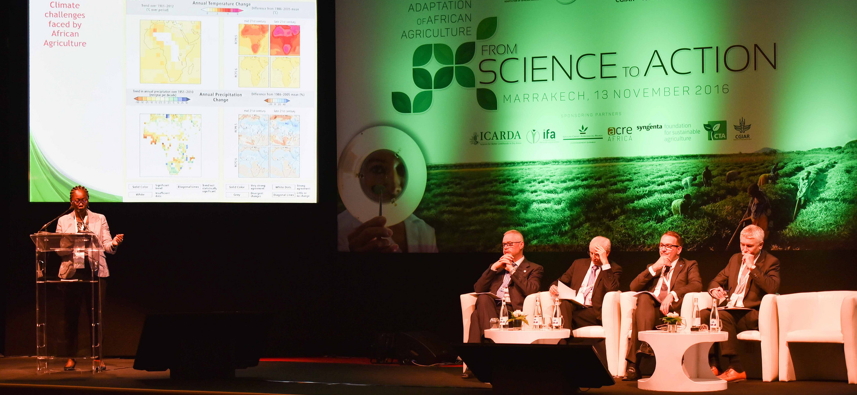Despite being dubbed “The COP of Action”, that will transform the Paris Agreement from pledges to progress, talks to include agriculture in the climate negotiations have once again stalled at COP22 in Marrakech. Further discussion on the topic has now been postponed to May 2017, at the next meeting of the Subsidiary Body for Scientific and Technological Advice (SBSTA).
However, momentum has been building around a regional initiative, known as the AAA initiative, that focuses on finding solutions to adapt African agriculture to climate change. At an event co-hosted by the Moroccan government and the CGIAR Research Program on Agriculture, Climate Change and Food Security (CCAFS), experts gathered to determine priorities for collective action that will help African agriculture to build resilience to climate change, as well as feed the continent.
Representatives from the government of Morocco joined researchers, entrepreneurs and farmers from across Africa to discuss the most promising adaptation solutions for the continent.
Mohamed Ait Kadi, president of the General Council of Agricultural Development, Morocco, told the audience: “We have billed this COP as a COP for Africa, providing a unique opportunity to showcase action for Africa, in Africa. The Paris Agreement explicitly refers to safeguarding food security. In my view, the willingness to address agriculture and food security finally appears to be having some impact. We call this initiative ‘Triple A’ mainly to include the fact that investment in the Adaptation of African Agriculture is a triple A rated investment.”
According to a report released last week by the International Fund for Agricultural Development, for each dollar invested through the Adaptation for Smallholder Agriculture Programme (ASAP), farmers could earn a return of between US$1.40 and $2.60 over a 20 year period by applying climate change adaptation practices.
During a session dedicated to sustainable soil management, experts showcased the solutions and challenges facing the continent. Professor Tekalign Mamo, Program Director at the Ethiopian Agricultural Transformation Agency, highlighted his country’s EthioSIS digital soil mapping project that has allowed for custom-blended fertilizers to be produced, and distributed at the local level. When used in conjunction with other improved agronomic practices, the project has already seen yield rises of up to 65%. Charlotte Hebebrand, Director General of the International Fertilizer Association (IFA) said: “Africa has the potential to get the best of both worlds by ‘leapfrogging’ into more integrated soil fertility management.”
She added: “By optimising its fertilizer use, no less and no more, the continent can significantly increase average crop yields while keeping greenhouse gas emissions to a minimum.”
In addition to mobilising investment, the event outlined the following priorities for collective action:
- Building the capacity of African nations to adapt – through both regional partnerships and North-South, South-South exchanges
- Supporting technology transfer and innovation – by building policy frameworks that enable technology adoption, and the institutional capacity to determine locally-appropriate solutions
- Measuring and monitoring progress – by including indicators for measuring adaptation in agriculture in accountability frameworks associated with the Paris Agreement
For more information on agriculture’s role in the climate negotiations, visit the Farming First UNFCCC Toolkit.
Featured images courtesy of Neil Palmer (CIAT)



